
Fast, affordable Internet access for all.

Advocates for better Internet access are breathing a sigh of relief in New York as the State Assembly passed a budget bill yesterday that did not include an amendment that would have undermined the state’s municipal broadband grant program.
As we reported last month, buried in language near the bottom of the Assembly budget proposal was a Trojan horse legislative sources said was being pushed by lobbyists representing Charter Spectrum.
The amendment, which did not survive the budget reconciliation process, proposed to limit Municipal Infrastructure Program grants to projects that targeted “unserved and underserved locations only” – a restriction that would have made municipal broadband projects in the state less likely to become financially viable.
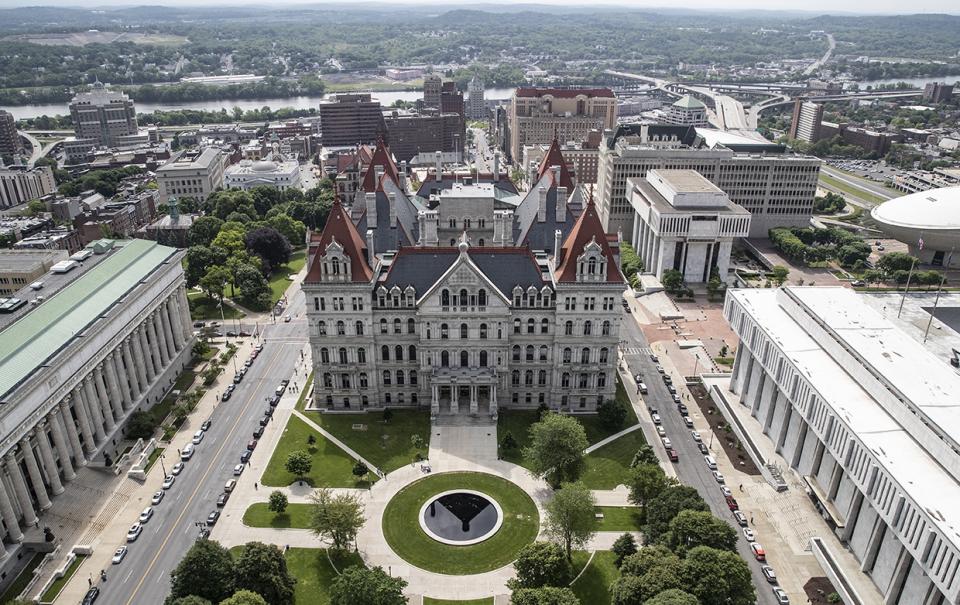
Created as part of New York’s billion dollar ConnectALL Initiative, the MIP is specifically designed to support municipal broadband projects. Such projects are routinely targeted by lobbyists for the big monopoly providers intent on preventing any competition to their often spotty, high-cost service offerings.
*In partnership with Broadband Breakfast, we occasionally republish each other's content. The following story by Broadband Breakfast Reporter Jericho Casper was originally published here.
In a setback to efforts aimed at enhancing broadband access across Wisconsin, the state Senate dealt a blow to three key bills aimed at improving various aspects of broadband provision Monday.
The first bill in question, AB 1180, aimed to give local governments more autonomy by allowing them to apply for broadband grants directly, rather than requiring them to partner with a telecommunications utility or a for-profit organization, as is required under current (state) law.
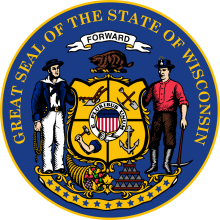
The bill also proposed expanding the permissible uses of grants beyond infrastructure construction and would have eliminated a requirement for a city, village, or town to prepare a feasibility report before constructing or operating facilities for public telecommunications, cable TV or broadband services.
Presently, Wisconsin law necessitates a public hearing before a local government can pass an ordinance or resolution to provision such facilities. Additionally, at least 30 days before this hearing, these entities must furnish a comprehensive report to the public, detailing the facility's costs, revenues, and a cost-benefit analysis spanning three years. AB 1180 would have waived the need for this report preparation.
Manding Internet Service Providers Deliver Advertised Speeds
Cullman, Alabama-based Cullman Electric Cooperative says it is launching a new phase of fiber deployment after receiving a $7 million grant to bring affordable fiber access to long-neglected Cullman and Winston counties.
The financing was made possible by the Alabama Broadband Accessibility Fund (ABAF), funded by the 2021 American Rescue Plan Act (ARPA). The state has already dedicated more than $82 million in funding for Alabama broadband deployments, bringing broadband access to 72,000 currently unserved residents.
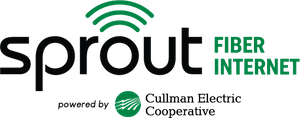
Cullman’s $7 million portion will bring affordable fiber access to 1,300 families. Known as Sprout Fiber Internet, Cullman currently offers residential customers symmetrical 300 Mbps (megabit per second) service for $60 a month; symmetrical 1 Gbps (gigabit per second) service for $80 a month, and symmetrical 2 Gbps service for $120 a month.
That’s significantly faster and cheaper service than is currently offered by any of the dominant private telecom monopolies in Cullman (predominantly AT&T or Charter/Spectrum), without usage caps, hidden fees, or long-term contracts.
Five years ago, the Central Virginia Electric Cooperative (CVEC) announced the creation of the Firefly Broadband initiative, a subsidiary specifically built to leverage the co-op’s existing electrical assets to deliver affordable fiber to 13 underserved Virginia counties.
Half a decade later, the coop says it has successfully completed its $150 million expansion project, deployed 3,600 miles of new fiber, passed 40,000 total homes and businesses, and directly connected 20,000 state residents–many for the first time ever–in less than 52 months.
“Central Virginia Electric Cooperative partnered with Conexon to perform a feasibility study for a fiber build across their entire service territory – 13 counties and 3600 miles,” CVEC VP of Communications Melissa Gay told ILSR. “Once the target costs, offerings and take rates were determined, we chose to race to secure supplies and labor. Finding great partners has been a tremendous help to the success of our project.”
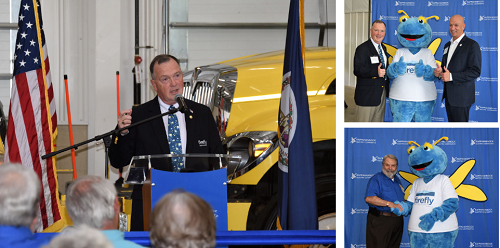
Buoyed by numerous grants including a $28 million combination loan and grant from the USDA's ReConnect Program, Firefly now provides local residents symmetrical 100 Mbps (megabits per second) fiber for $50 a month, and symmetrical 1 Gbps (gigabit per second) service for $80 a month. There are no contracts and no data caps.
About 90 percent of households connected had no broadband access previously, according to Bruce Maurhoff, Firefly’s senior vice president and chief operating officer.
Allegan County, Michigan will soon receive a $30 million state grant to finalize the deployment of a new open access, carrier-neutral fiber network. The end result will bring overdue competition – and affordable multi-gigabit fiber access – to long neglected communities by 2025.
The $30 million award is part of Michigan’s $238 million Realizing Opportunity with Broadband Infrastructure Networks (ROBIN) grant program, made possible by 2021’s American Rescue Plan Act (ARPA) and the resulting Capital Projects Fund.
123NET was chosen by Allegan County in late 2021 to help spearhead the Allegan County Broadband Project. The public-private partnership will bring access to more than 10,000 Allegan County residents either underserved or completely unserved by regional telecom giants, spread out across 1,000 square miles.
123NET and Allegan County had already committed to contributing $17.5 million for the construction of the network, with the county’s share coming from earlier ARPA awards.
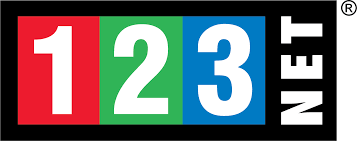
"We are pleased to be selected as a recipient of the Michigan ROBIN Grant Funding. This recognition validates the hard work and dedication that both we and Allegan County have put into this Project,” Dan Irvin, CEO of 123NET said of the award. “We look forward to partnering with additional communities throughout Michigan in a combined effort to make this state the best connected on the planet."
It was a big week for ECFiber as Vermont’s first – and oldest – Communication Union District (CUD) celebrated lighting up the last hub of its 1,500 mile-network in White River Junction.
To mark the occasion of connecting the “golden patch cord” that will extend high-speed Internet service to eight more communities in the Upper Valley region, White River Junction’s VFW Hall was packed this past Tuesday with CUD officials, local and state leaders, enthusiastic residents, and U.S. Sen. Peter Welch. They were there to celebrate what ECFiber officials liken to “the Golden Spike moment tying the first transcontinental railroad together.”
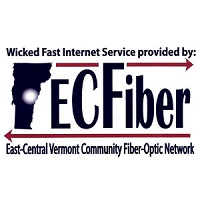
After a 30-piece band played marching tunes, ECFiber Chairman F.X. Flinn marched to the podium to describe the meaning of the moment.
"It’s come to fruition today with a lighting of the White River Junction hub," he said. "This is the last piece of the puzzle for the network we originally envisioned that would bring world-class broadband to every home and business in the 23 member towns that originally voted town meeting day 2008 to create ECFiber."
Sen. Welch, an ECFiber subscriber who also spoke at the event, credited the state’s community broadband approach as the linchpin to solving the state’s digital divide:
“If we in rural Vermont were going to depend on the big telecommunication companies to wire our homes and get us Internet, we’d be waiting until our grandchildren had grandchildren. It wasn’t going to happen.”
Eight More Towns Join CUD
Sometimes local coalitions can beat Goliath.
In July of 2022, Louisiana Gov. John Bel Edwards and several state lawmakers visited Lake Providence in East Carroll Parish to announce the community had secured a $4 million grant to build a fiber-to-the-home (FTTH) network in one of the most poorly connected parts of the state.
But, as we first reported here, the monopoly cable provider Sparklight (formerly known as Cable One) filed a challenge to the grant claiming the cable company already serves 2,856 homes there. Following Sparklight’s multi-state campaign to prevent competition in areas where the company operates, the challenge brought the project to a grinding halt, sparking Delta Interfaith to leap into action. With the help of allied organizations, the coalition was able to secure a major victory for community broadband in rural Louisiana.

The Power of Community-based Coalitions
In Wisconsin, Republican state lawmakers voted earlier this month to kill Gov. Tony Evers’ plan to invest $750 million of Wisconsin tax dollars to expand high-speed Internet infrastructure across the Badger State.
Republicans on the state legislature’s budget committee voted to reject the proposed broadband funds, arguing that the state should wait for Wisconsin’s forthcoming share of the $42.5 billion in federal BEAD funds instead.
Although the state has a record budget surplus projected at more than $7 billion, it’s the first time in the past decade the GOP-controlled state legislature has not allocated funds to expand broadband, which drew a blunt rebuke from Evers spokesperson Britt Cudaback.
“It’s outrageous that Republicans have absolutely nothing to show for plans to actually address the pressing challenges facing our state — embarrassing doesn’t begin to cover it,” Cudaback told the Wisconsin State Journal.
The state is expecting to receive between $700 million and $1.1 billion in BEAD funds from the bipartisan Infrastructure Investment and Jobs Act (IIJA) with the state's Public Service Commission (PSC) estimating the total cost of deploying expanded broadband infrastructure statewide to be about $1.8 billion.
The United States Department of Agriculture (USDA) has awarded a $17.5 million grant to NEK Community Broadband (NEK Broadband), providing another shot in the arm for Vermont’s fast-growing collection of Communications Union Districts (CUDs). Such CUDs continue to play a starring role in Vermont’s efforts to finally conquer the digital divide.
NEK Broadband’s latest grant comes from the USDA’s ReConnect Loan & Grant Program, which helps defray the costs of network hardware and broadband deployment to rural and traditionally underserved U.S. markets.
The program this week doled out an additional $714 million in grants and loans to projects across 19 states.
NEK Broadband officials say its $17.5 million award will be combined with a $5.8 million investment to deliver affordable fiber access to 3,295 homes, 94 businesses, 183 farms and 11 educational facilities across 22 towns in Orleans, Caledonia, and Essex counties in Vermont.
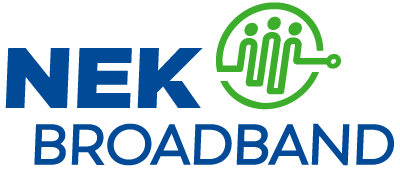
“For too long, large pockets of our state have been denied this critical resource because companies haven’t found it profitable enough to invest,” Vermont Senator Bernie Sanders said in an announcement of NEK’s latest grant. “This federal funding is transformative, because the money is going directly to the very communities who will benefit, instead of having to go through those who care more about profits than delivering service.”
The Port Of Whitman County is one of several rural Washington communities set to nab another major infusion of broadband grants courtesy of federal Covid disaster relief. A fresh infusion of $1.1 million announced last week will help the County expand a five city (Palouse, Garfield, Oakesdale, Tekoa and Rosalia) fiber expansion project to 104 unserved homes.
In partnership with Ziply Fiber, the Port will bring fiber connectivity to those homes that were not included in the first phase of the project. According to city officials, construction will begin in the fall 2023 and be complete by spring 2024.

It’s part of a broader $121 million in new broadband grant awards doled out by the Washington State Broadband Office to expand access to affordable broadband service across traditionally underserved portions of the state. All told, the new awards will be used to fund more than 19 different projects, bringing improved broadband access to nearly 15,000 state residents.
“These grants will provide initial service availability to 14,794 end users located across the state, in communities as diverse as the San Juan Islands, Kittitas County and the Spokane reservation,” Washington Broadband Office Director Mark Vasconi said of the latest round of funding.